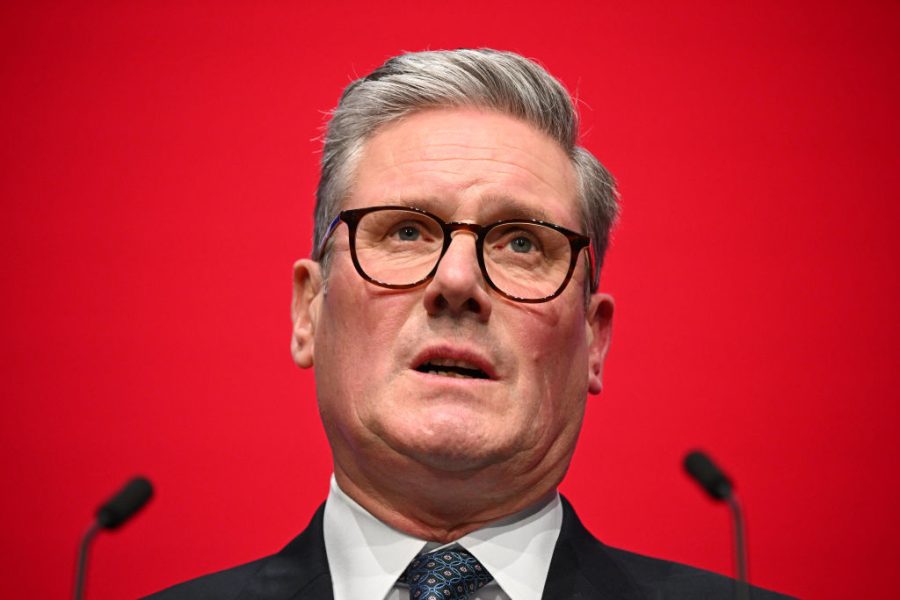The standout line from Sir Keir Starmer’s first speech to conference as prime minister – the one that will be quoted far and wide – will not have been what he planned. With his most serious, most pained expression, Sir Keir called for ‘an immediate ceasefire in Gaza’ and… ‘the return of the sausages’. He corrected himself immediately, of course – he meant to say hostages – but at that point he was (forgive me) cooked.
While the faces of his front bench colleagues were effortfully composed in the hopes of pretending that their leader hadn’t just said what he just said, you know that their minds were feverishly imagining what the photoshop guys and pun technicians were going to do with that for tomorrow morning’s red-tops. Anyone can make a slip of the tongue. But this one hit particularly hard because its absurdity contrasted so strongly with the earnestness with which it was delivered.
At times, Sir Keir sounded like a quiz show contestant racing the countdown clock
Sir Keir’s speech, apart from that, was super boring. I’m trying to work out quite why. You expect conference speeches to be boring, but this one really excelled in that department. My best guess is that it’s to do with Sir Keir’s unvarying cadences. Everything was serious, over-emphasised, and a little adenoidal (when he first took to the stage to congratulate the young man who introduced him – ‘thad was reely fadtadstig’ – it sounded like he had a blocked nose).
He didn’t speed up or slow down. There was no light and shade. With rare exceptions – he managed a bit of fire when condemning the ‘minority of violent racist thugs’ in the recent rioting, and earned a standing ovation for it – the bits where he tried to sound passionate recalled nothing so much as Iain Duncan-Smith’s wooden declaration all those years ago that ‘the quiet man is turning up the volume’.
The very occasional attempts at humour – a likely pre-planned riposte to the inevitable protester (‘This guy’s obviously got a pass to the 2019 conference! We’ve changed the party!’); an underpowered anecdote about a visit to the Lake District – didn’t land, and were mechanically followed by a phrase guaranteed to kill a laugh: ‘But seriously…’
Nor did the speech have any obvious narrative shape or rhetorical structure. He used the figures of rhetoric, right enough – but he overused them. Normally you want to save the showier techniques to make your peroration stand out, and use some more discursive material in the body of the speech. Take anaphora, where you repeat a phrase at the beginning of successive sentences to emphasise it. If you do that constantly, it’s subject to a law of diminishing returns. Everything sounds rote.
This speech was a stack of anaphora sandwiches. ‘People said… People said… People said…’; ‘Take pride… take pride… take pride…’; ‘A law… a law… a law…’; ‘Politics can… politics can…’; ‘A country that… a country that…’; ‘Change isn’t… change isn’t…’. On, and on, it went. And the fish paste in this stack of sandwiches was the verbless list.
At times, Sir Keir sounded like a quiz show contestant racing the countdown clock. ‘A crackdown on knife crime,’ he would say, portentously:
A real living wage. A modern industrial strategy. A 10-year plan for our NHS. Devolution to our nations, regions and cities. The biggest levelling-up of workers’ rights in a generation. More teachers. More neighbourhood police. More operations.
‘Technology,’ he would say, portentously. ‘Climate change. The ageing population. The movement of people.’ ‘Our rivers polluted,’ he would say, portentously. ‘Borders insecure. School roofs crumbling. Child poverty rampant. Nothing seems to work. Our public finances broken.’ ‘An NHS facing the future,’ he would say, portentously:
More security and dignity at work. Town centres – thriving. Streets – safe. Borders – controlled at last. Clean energy – harnessed for national renewal. New homes, new towns, new hospitals, roads and schools. A new future for our children.
So it went on. Run of anaphora… verbless list… run of anaphora… verbless list. Verse, chorus, verse, chorus. Was he hoping to harness the national enthusiasm for Oasis reforming by modelling his speech on their relentless midtempo rock chug?
Sprinkled amid this were a set of repeated epithets that never quite coalesced into a theme: ‘respect’, ‘service’, ‘renewal’, ‘working people’, ‘a Britain that belongs to you’. Sir Keir has a gift for the unmemorable phrase. Intellectually, saying that ‘taking back control is a Labour argument’ might make sense (he was being admirably candid about reining in the free market), but rhetorically it put him on the back foot.
At another point he said, ‘You may call it populism. But I prefer to call it “the politics of easy answers”.’ You may cheer the sentiment to the echo, and still find that a hopeless piece of oratory. It turns one word into five – and a pallid, unmemorable five words at that. Here you want a zinging soundbite expressing rage at the laziness and cynicism of the populists presenting easy answers to complex questions. Instead you get a phrase that you don’t for a second believe Sir Keir or anyone else applies in private to the populist right.
Perhaps he could learn something about oratory from the populist right. Donald Trump may not be admirable in every respect, but when he tries to stick an unkind nickname on his enemies it’s almost always a banger.








Comments